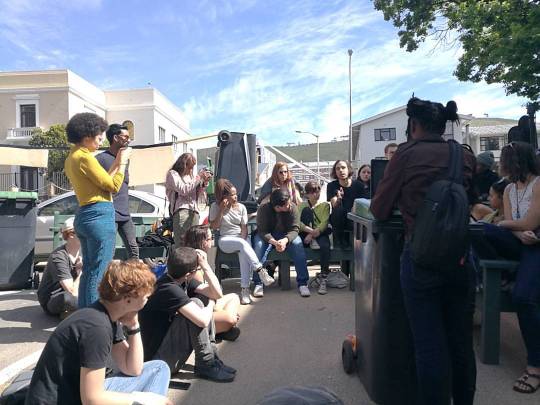#feesmustfall2016
Explore tagged Tumblr posts
Photo

Photo A Day: Fees Must Fall 2016.
#photo#potraits#photography#photograph#photojournalism#Africa#SouthAfrica#AfricanPeople#PhotoADay#FeesMustFall2016
1 note
·
View note
Text
Fees Must Fall. The 2016 Reboot.
Last year, I wrote a little about Fees Must Fall when it was still in its early days (I suggest reading it after this to avoid the impression that all my views are quite so cynical). There was also a follow-up piece, which is less relevant here. A group of us later drafted a document with broad ideas on a way forward.
And here we are again. Well, kind of. I don’t know if this year’s movement is different, or if, in the intervening year, my perspective has changed. It’s likely that the imminent possibility of finally graduating is also skewing my perspective. I suspect it’s a combination of these things that has affected my outlook. Whatever the case, I’ve started typing, and I hope this goes somewhere. As with the first post, I’ve added in some images and GIFs to relax it a bit.
A section with links to some good articles (and other stuff) on the topic has been added at the bottom. Take a look.
Nzimande’s Announcement
As you are likely aware, the Minister of Higher Education and Training made an announcement on Monday 19 September consisting of the following:
A recommendation that fee increases at universities and colleges do not exceed 8%
A subsidy (via NSFAS) for all students with an annual household income of less than R600,000, effectively reducing the fee increase for these students to 0%
Whatever your overall position, this is clearly a step in the right direction, particularly for the so-called “missing middle”. Of course there are some details missing, like whether he was referring to gross or net income, but R600,000 equates to a monthly income of R50,000. Furthermore, if that R600,000 was earned by a single individual, it would place them in the top 0.08% richest people in the world.
Where this announcement falls short is in addressing access for those disadvantaged students unable to pay the current fees, let alone an increased fee. Students with an annual household income of R160,000 or less are eligible to apply for NSFAS, but that doesn’t guarantee it, there may still be additional contributions, and it is often said that the means test is flawed (although I have no good source for this). On top of this, NSFAS is a failing system, which I’ll address a bit later.
And yet, there is one further perspective to add. Things cost more every year. In fact, in degrees such as mine, costs increase well above the changes in the prevailing CPI for various reasons, including fluctuating exchange rates and technological advancements.
Still, if we imagine that university costs increased by 8% a year, fee increases stayed at 8% as well, and that these increases were consistently subsidised down to 0% for the poor and missing middle, this equates to a halving of the real cost of fees for these students in approximately 10 years. I don’t know if this is too slow, or if this is quick. It’s just something to think about.
{Yes, I know that there are some necessary assumptions, and some big variables. One big one is the fact that family incomes don’t tend to simply increase along with inflation. The concept still holds}

Access to Higher Education
Recently, there appears to have been some confusion about the Bill of Rights. As I mentioned in last year’s piece, it’s very clear about Basic Education, which is why we spend a lot on it. It’s a lot less clear on "further education, which the state, through reasonable measures, must make progressively available and accessible“.
I have no idea what that means. The state has made further education progressively available and accessible, and “reasonable measures” is incredibly vague. Proportional to our GDP, the minister acknowledged last year that we under-spend on Higher Education, but perhaps this should be considered along with how much more we spend on Basic Education.
At the same time, we must think about the whole of Higher Education. On one hand, we have the more privileged saying things like “I mean it’s not all about university. The job market is saturated with people with degrees. We have a real skills shortage.” On the other hand, we have those of a less privileged background under the impression that a university education is the only way to break a cycle of poverty. What these parties seem to have in common is the condescension with which they look upon forms of higher education other than university education.
I, personally, am a big believer in formal education as a whole. (While you’re reading this, I might as well punt a thing I wrote about it). Still, while I don’t have any references to back this up, I expect that someone who studies Engineering-based courses, plumbing or computer skills somewhere like Central Johannesburg TVET College (which, by the way, receives public funding too) is more likely to be a significant economic contributor than someone who studies something like a BA with Honours in Drama Therapy.
I don’t mean to belittle the field, or anyone in it, and yet, particularly in a discussion around the use of public funding and public upliftment through education, one needs to think about the economic impact very carefully, on an individual level as well as a societal level, especially in the context of a developing country with a stagnating economy.

Proposed Solutions
It occasionally seems necessary to point out that there is no such thing as “free”. Someone has to pay for it. Currently, there doesn’t seem to be anyone managing to get a full-formed solution forward. There are a number of ideas on how to get the funding, and, while I won’t include all of them, here are a few that have popped up:
Reducing Corruption Losses: This one is mentioned time and again. We don’t actually know how much money is lost to corruption, despite some happily citing an inaccurate figure of R700bn in the last 20 years. Still, we can safely say that it’s a lot and, sure, if the corruption issues were solved, it could theoretically be redirected to funding university fees in future. Even if that figure were true, it wouldn’t be the relevant amount, since that money is already gone. Either way, public pressure could, theoretically make government address corruption and redirect the surplus funds. Theoretically.
Reducing Funding to Under-performing Entities: In our proposal document last year, we mentioned under-performing SETAs and SEOs, and very little seems to have changed since then. For example, simply typing “saa “ into my search engine suggested “saa bailout”, and, while they don’t make the headlines, there are frequent reports of SETA mismanagement and corruption.
Raising Company Income Tax/adding a mandatory contribution: The logic is that, seeing as companies benefit from university graduates, they should pay for these graduates. What this line of thought neglects is that companies already do contribute, firstly in the form of existing tax and secondly, by paying these university graduates salaries. In fact, increased expenditure could reduce the number of graduates hired. That said, from what I understand, the suggestion of an additional corporate contribution at a recent Business Leadership SA meeting wasn’t as controversial as one might expect.
Raising Individual Income Tax: Our VC recently mentioned a theoretical 1-2% increase in personal income tax for the rich, and, on the show where he did so, the host pointed out that the increase would need to be more significant. I can’t seem to find his source, but I expect he’s right, seeing as our tax base is puny. On top of this, fiddling with tax rates can have all sorts of unforeseen economic effects, and I can already imagine the people popping out of the woodwork brandishing their Laffer Curves.
Tiered Fees: The idea that one’s fees are based on their household income is an interesting one, and seems palatable to a number of people. Of course, this idea would need to be carefully considered. Without adequate government funding filling the gap, the wealthier students would be expected to contribute a disproportionate amount, which would likely drive them to other institutions, collapsing the system. The idea of ‘pay-what-you-can’ is kind of working in the healthcare, so maybe it could work here too.
Redirecting Existing Money: Last year, an venture capitalist at one of the mass meetings, and others on other occasions, made mention of redirecting funds from things like the defence budget, unaware that defence spending has effectively been cut, and that it’s actually an underfunded area. More recently, a well-written, but economically misguided document with some faulty maths by one of our medical students made mention of mineral resources. among other things. And yet, the declining resources sector aside (despite profitable resources like manganese, chrome, platinum, etc.), it represents a misunderstanding of ownership and where revenues go. Of course, this could bring us to the nationalisation debate, which is beyond the scope of this piece and which, despite what some may think, isn’t simple. For now, what the government receives from this is already allocated and used somewhere.
It’s likely that there are people and groups with fully-formed proposals. As far as I know, Business Leadership SA had one, which was proposed to government representatives as well as national student representatives not too long ago. I don’t know what happened beyond that, but I don’t know of any communication to students on the content of this proposal.
The SRC approach, so far, has involved shutting universities down, gaining public attention through media outlets and disrupting traffic, using all of this, ostensibly, to throw down the gauntlet to government to find a solution which, admittedly, is strategically sound. Reassuringly, on a TV panel discussion, the Wits SRC SG did mention a proposal which should be released in the next few weeks. The other student approach seen at some universities seems to be the age-old tactic of setting things on fire. I’m not sure how effective that is, although I’m well aware that it was effective when the TUT students did it last year.
Last year, there was a lot of talk about the 2012 report by a working group which seems to contain a feasible model for funding free university education for the poor. In fact, Prof Habib mentioned this report and questioned government’s reluctance to act on it during the TV show mentioned above. The report makes mention of a few of the options I mentioned above, but with a lot more detail and a lot more context. The full text is well worth the read, and can be found here.

“But that money could go somewhere else”
This is a common response for people who have little else to contribute. They’re not entirely wrong, but it depends entirely on which source of funding one is discussing and, for the people I’m talking about, it’s usually when on the topic of money lost to corruption or under-performing entities. Which is where the problem lies. These are, for the most part, not people actively trying to get this lost money allocated to causes they consider more worthy. These are people choosing to be apathetic except in the current situation, where they feel personally involved. So sssshhhh. If you’re going to say this, add more to it, get some numbers, perhaps explain why one matters more than another, and work on getting the money directed there.

What I’d Maybe Do
“Ugh. Nobody asked you” you say. And you’d be right. And yet here I am writing it, and here you are reading it.
I'm quite proud of the document we drafted last year. You can tell because I mention it too often. It was drafted at a time when the student voice was united against a fee increase, when there was less confusion about our aims. I only read the working group report some time later, and as you can see, our document pales in comparison, to say the least, in terms of detail and number-crunching.
Still, here’s a vague outline of how I’d approach the issue moving forward:
Allocate a significant extra bolus amount for the next few years to NSFAS
Top it up with funds redirected from failing SETAs and SEOs, and wherever else there might be excess fat. Perhaps some of the mythical corruption money we’re going to recover can also end up there
Increase the threshold for NSFAS loan qualification to include everyone up to the missing middle, perhaps based on the household income up to R600,000 (or perhaps not. It seems an arbitrary figure). Other components of the existing means test could perhaps be incorporated if necessary, and would be more justifiable with the higher household income brackets
Provide NSFAS loans at sub-prime interest rates with government as the guarantor
Surprise plot twist: collect NSFAS debts effectively! Allow up to twice the length of the degree funded for full loan repayment, and restructure NSFAS so that its administrators are able to properly collect debt
There are a few things to note from my suggestion. The first is the mention of the large NSFAS bolus for ‘a few years’. This would depend on the number of years necessary to get repayment of a few years’ worth of graduates. Once it has this base amount, it should be able to fund subsequent years with far lower government contribution. In fact, if it were allowed to build up a surplus of sorts, this could be invested in other avenues, to partly make up for the losses due to inflation and the sub-prime returns.
NSFAS debt collection needs to be drastically changed. They’re currently unable to do a good job of recovering debt, and when they start to, they seem not to try very hard. Quite frankly 3%-8% of one’s annual salary is far too low. To put it in perspective, a person earning R30,000 a year would be expected to make an annual contribution of R900. This would mean that the principal for an imaginary 4 year degree costing R50,000 a year would take 222 years to repay.
I don’t seem to have the calculations available, but the allowance of twice the length of the degree funded was calculated as being reasonable last year, and allowed for periods of unemployment in between. Of course, this makes things a bit more difficult for those choosing to go into fields that aren’t as economically productive, where employment is less available and pay is lower. Sorry about that. Alternatives include different fields of study (university and otherwise) and different sources of funding.
Lastly, notice how NSFAS bursaries are not mentioned, because, from my perspective, they are simply a loss of capital that could be used to fund another deserving student’s loan.

But you didn’t mention free university
Correct. I didn’t. I’m thinking intermediate term. The working group’s report highlights the possibility of ‘fee free university education for the poor’. In fact, one of its big shortcomings is its focus on the poor, its difficulty in defining this group, and the resulting exclusion of massive swathes of our population not falling into this category.
Instead, I wouldn’t provide free university education in the near future. If the aim of university education is to attain gainful employment, then a portion of those gains can reasonably go to repaying the source, and providing similar opportunities for others. Of course, the specifics such as the duration for repayment, and how interest would work could be entirely different, but repayment makes all the difference. And as I mentioned, “free” isn’t free.
And while I berated some for saying this just a few lines ago, money that could be used to fund “free” higher education could be better used elsewhere. Poverty is rife, basic services and infrastructure are lacking to many, and we have a behemoth of a health insurance scheme coming soon. “Free” university education isn’t the panacea some seem to believe. Apart from these issues, money needs to be available to build and expand universities to better address the access issue.
Instead, it seems far more reasonable to me to massively increase access with cheap, recoverable NSFAS loans in the manner mentioned above, with the aim of stimulating our economy (which, as I mentioned above, is stagnating), and expanding the tax base. Once we have more than 5% of the labour force contributing 50% of the tax revenue, and enough funding has gone to infrastructure, grants and health care, we can look to more optimistic ideas.

The Law
I wasn’t there last week when the teargas, stun grenades or rubber bullets were used and so, it is unwise for me to comment on specific incidents. I was there when they were used last year, and I am vaguely aware of the university interdict which, from what I understand, still applies, and of things like bylaws in general. I also tend to trust reports of police and private security sometimes using disproportionate force, which must be condemned in the strongest terms and addressed by police and security hierarchies respectively.
And yet, while I tend to disagree with many of his writings, as well as a lot of this piece, David Benatar makes two very good points in it:
Asking that the law be obeyed applies both ways. Just as disproportionate use of force is illegal, so are disobeying the interdict (as far as I understand interdicts, which are said to enforce rights) and obstructing roads
The law is ultimately backed up by force, be it within legally defined limits. This tends to involve escalation from verbal requests

The Majority View and Ethics
I don’t know what the stance of the majority of students is on the current state of affairs. Those who are against the movement assume it comprises a minority, largely based on the faulty assumption that only those present in person support it. At the same time, the SRC representative’s recent refusal of the suggestion of a referendum by the VC on TV shows that they are, at best, unsure themselves and at worst, in a minority.
I am no ethicist. Of the few ethics lectures I attended, I think I napped in most. Still, there is room for an interesting discussion here. Some of those associated with the movement speak and tweet (some very telling tweets deleted) implicitly of things like “the greater good”, often in spite of being a possible minority.
Firstly, we can briefly address the idea of the greater good (and again, I am no ethicist, so I have likely oversimplified this all). If one were to think like Kant, one would think something similar to his famous quote, that “Man, and in general every rational being, exists as an end in himself, not merely as a means for arbitrary use by this or that will: he must in all his actions, whether they are directed to himself or to other rational beings, always be viewed at the same time as an end.” To the consequentialist, however, the greater good matters more.
If we accept the currently defined goal as the definite greater good, there are two assumptions being made. The first is that it is worth the sacrifices made by (and forced on) students and others (often reduced to “inconvenience” to appease consciences). The second is that the action is the most effective way to bring about the goal. These are both huge assumptions.
This all gets a bit muddier once we have to figure out who decides what the greater good is, what the reasonable sacrifices are, and whether these result in the good outcome. On top of this, we have the mess of clarifying the mandate of those elected (well, kind of) to represent us. Personally, I find this all a bit confusing, and worry for anyone who doesn’t. I’m not one to take the lead from religious leaders, and statements like this don’t help me much at all.
In any case, the university is calling for a sort of referendum involving students and staff this week, potentially overseen by the IEC. It’s a very smart move because if, as they expect, the majority decision is to resume academic activities, they’ll have public sympathy in “addressing” protesting students, or at least, those preventing others from continuing their studies. Of course, if that isn’t the majority decision, I have no idea what will happen.

The End. Finally
I’ve written a lot. Probably too much. Definitely enough to upset some people. As with the ethics discussion above, I generally don’t know how anyone can be certain about any of this. Nevertheless, I’ve written a fair bit of what I think, which helps me think a bit more.
To summarise everything (as I did with my first post):
Nzimande’s proposal wasn’t enough, but it wasn’t nothing. It included a way toward an effective halving of fees in 10 years. Kind of.
The constitution isn’t too clear on how accessible university education should be by now. Also, don’t be condescending about other forms of higher education.
A number of ideas have been vaguely mentioned, and the most concrete proposal is the 2012 working group document.
Just saying “that money could go somewhere else” doesn’t contribute anything to the conversation.
Personally, I’d fix NSFAS, and grow it, using it as a low-rate loan scheme for low and middle income students. I am no expert.
Low rate NSFAS loans with long repayment terms seems more reasonable than immediate free education, partly because of its potential to bear economic fruit and partly because we have plenty of other pressing expenses.
The law works both ways.
What is the greater good, who decides what it entails, and what happens to individual agency?
I’ve left a lot of my thoughts out. Some of them I covered in last year’s posts (yes, that’s another punt) from which my perspective doesn’t seem to have changed as much as I thought. Some of them I’ve deliberately left out (such as those on the wider impact of the shutdowns, the rise of self-appointed leaders in certain vaccum-type arenas, decolonisation vs “decolonisation”, etc.). The rest has already been said, either better elsewhere, or just ad nauseum.
Whatever your stance, thanks for reading this. The discourse recently has been dominated by an us-vs-them mentality, where people on both sides, trapping themselves in echo chambers in person and social media, are quick to attack or dismiss those who don’t share their exact ideology. It’s a dangerous, fruitless approach to an issue as big as this. As always, I’m happy to discuss these things using various media, as long as you’re willing to engage instead of simply hurling insults or rhetoric. I’m particularly interested in discussing solutions, or building on my vague one.
Thanks
Faheem :)
PS: I mentioned it last year, but Habib is probably not the enemy. While he does represent the structure for most, he’s just a man walking the tightrope between doing his job and being relatively pro-student. I’d like to remind you of this piece he wrote well before FeesMustFall 2015, among others. It is, as it was last year, unacceptable that his home was approached and that entry was attempted. See above regarding the law.
Some articles (and other things) worth a read
*This section will be moved to a separate post, as per multiple requests to do so*
4 notes
·
View notes
Photo

Students have shutdown UCT's Hiddingh campus to have open conversations about their experiences. #feesmustfall2016 (at Michaelis School of Fine Art)
3 notes
·
View notes
Video
instagram
Santa baby been a bad bad boy. #notointimidation #teampetty #shutdownhiddingh #feesmustfall2016 #fees2017 (at UCT - Hiddingh Campus)
0 notes
Video
instagram
#shutdownhiddingh welcomes cadres from #feesmustfall2016 upper campus who have joined us in solidarity. Our student-led meeting begins at 1. All welcome to join the conversation (at Michaelis School of Fine Art)
0 notes